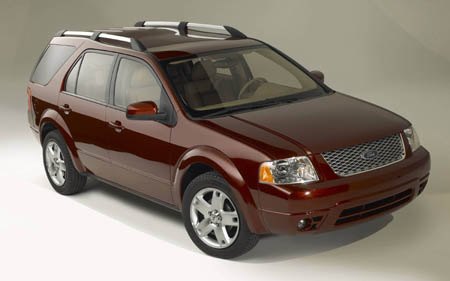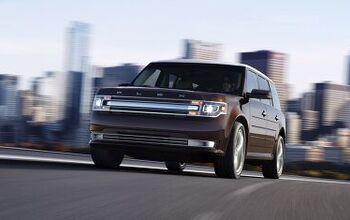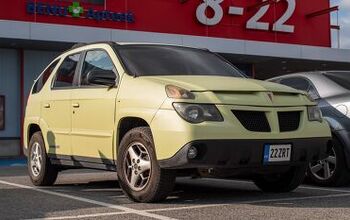Alternative Fools
Raging against SUV's is still all the rage. Despite the vehicles' continued popularity, the auto industry has heard the drum beat. And so they're developing and marketing eco-friendly alternatives to America's super sized SUV's. While none of these new vehicles will liberate the US from its dependency on foreign oil or scrub our skies clean, you gotta give Detroit credit for boldly going where they really don't want to go. And the results are not as dynamically dull as you'd imagine….
"Sports wagons" are an excellent example. The acceleration, braking, and handling of today's station wagons make SUV's look like yesterday's station wagons. Extreme machines like Audi's blistering S4 Avant, Mercedes E55 AMG estate and Dodge's Magnum SRT-8 will not only embarrass every SUV on the road, but many thoroughbred sports cars as well. Granted: the sports wagons' cornering abilities are limited by their extended wheelbase and gross curb weight. But none of them sports the SUV's 'tipping over truck' icon on the driver's visor. Nuff said?
Sports wagons also provide more 'utility' than all but an epic few SUV's. Compare the racy new Mazda6 Sport Wagon with the Mazda Tribute SUV. With the rear seats folded down, the Mazda6 sports wagon's carrying capacity is within 10% of the Tribute SUV's cargo room. With the seats up, the Mazda6 wagon actually has MORE schlepping space than its SUV cousin. And the 6's lower lift-over height makes it easier to load. As the average family's toting needs involve 2.5 children, groceries and alcohol– rather than soccer teams, Harley's and armoires– the sports wagon is almost always as practical as a mid-sized SUV.
So, sport wagons are an ideal SUV extraction device for drivers with stuff to carry who like to drive. Only one problem: the vast majority of US automotive consumers couldn't care less about driving pleasure. They view corners and curves as obstacles to the next piece of dead straight interstate or pancake flat parking lot. American SUV drivers want lots of room, a cushy ride, (perceived) safety and a high vantage point. Sport wagons fail on all but one of those criteria.
To appease the increasingly rabid anti-SUV lobby, automakers went back to the drawing board to create a whole new and exciting acronym: the "XUV" or "cross-over vehicle". The bastard child of the station wagon and SUV, the XUV is typically based on a car platform. Compared to an SUV, it's more reasonably sized, fuel efficient and stable in emergency maneuvers. And, if it all goes horribly wrong, the XUV's lower bumpers and lighter weight means there is less chance of turning the other car into a crushed soda can. The XUV is safer for you, safer for me, more eco-friendly and fits into a parking space smaller than Africa.
And… no sale. Jeep's by-the-numbers Grand Cherokee SUV currently outsells the Chrysler Pacifica XUV by more than two-to-one. Ford's Freestyle is still new to the market, but the safe money is that Ford's X-formula– a tall, bland-looking wagon with lots of room, a cushy ride and a high vantage point– ain't exactly setting the forecourts on fire. Mercedes' upcoming R Class XUV and BMW's much-anticipated "we-swear-it's not-a-minivan" minivan hopes to provide the missing ingredient: status. But it's far from a done deal.
While XUV's can do everything most people demand of an SUV, they lack one important attribute: the image of power. Remember Marge Simpson cruising behind the wheel of her "squirrel-crushing, deer-smacking Canyonero"? Bingo. That's what the SUV craze is REALLY about. A decade or so ago, when soccer moms started moving into rough-riding SUV's, they already had vehicles with lots of room, cushy rides and a high vantage point. They left their minivans because they weren't macho enough.
The truth is clear. American drivers will not abandon their SUV's to appease their (or someone else's) sense of environmental responsibility, even if presented with a perfectly reasonable alternative. The only way to stimulate a mass SUV migration is to charge a stiff federal tax on all new vehicle purchases proportional to the chosen vehicle's tailpipe emissions (already done overseas). Or Uncle Sam could add an annual environmental restitution fee to gas-guzzlers' price tags.
Of course, the chances that a federal government Hell bent on across-the-board tax cuts will penalize SUV drivers are the same as the odds of a Grand Cherokee beating an Audi TT around a race track. Instead of weaning Americans off of SUV's, Uncle Sam has elected to wean SUV's off of fossil fuel. By the 2007 model year, the minimum Corporate Average Fuel Economy (CAFE) for light trucks/SUV's will be raised (drum roll please)… 1.5 MPG. Sure, it's a start. But so is that hole in the ozone.
More by James Orwell
Latest Car Reviews
Read moreLatest Product Reviews
Read moreRecent Comments
- Jrhurren Worked in Detroit 18 years, live 20 minutes away. Ren Cen is a gem, but a very terrible design inside. I’m surprised GM stuck it out as long as they did there.
- Carson D I thought that this was going to be a comparison of BFGoodrich's different truck tires.
- Tassos Jong-iL North Korea is saving pokemon cards and amibos to buy GM in 10 years, we hope.
- Formula m Same as Ford, withholding billions in development because they want to rearrange the furniture.
- EV-Guy I would care more about the Detroit downtown core. Who else would possibly be able to occupy this space? GM bought this complex - correct? If they can't fill it, how do they find tenants that can? Is the plan to just tear it down and sell to developers?





































Comments
Join the conversation
What a difference time and higher gas prices make. 3 and 4 dollar a gallon gas should do the trick. We don't need the federal government making the determination what we should or shouldn't drive. High gas prices will do it
Ah, Sherman, if only it was so. Where i live, gasoline is currently about $3.15 per gallon and i see a growing number of super-XL vehicles sitting in increasingly congested roads all the time. Prices of fuel must rise much faster in relation to income before the typical auto buyer will notice. Nero bankrupted Rome in 68 AD building magnificent and glorious unneeded public works. The American driver will bankrupt the USA by 2068 AD if we continue building and buying stupidly inefficient -- but magnificent and glorious -- vehicles.